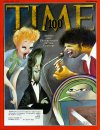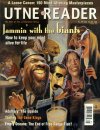| Science, Fiction, and points in between |
Bloomsday
Having recognized that James Joyce is the most influential writer of the 20th century (see below), it seems only appropriate to mention that today, June 16th, is Bloomsday, the day upon which Joyce's novel Ulysses is set. Fans traditionally celebrate this day with readings of the book, but this year is the first that the celebration has extended into cyberspace. A round-the-world reading of excerpts of the book is being held at the website for the Irish Times, though it may be about over by the time this notice is posted. In any case, here's an intriguing essay that wonders if James Joyce invented hypertext. (Tue 16 Jun 98)
Influential
 Time Magazine's June 8th issue is the second of its ''Time 100'' special issues that will profile, by the end of next year, the most influential (not 'best' or most popular) people of the 20th century. This installment covers Artists and Entertainers, and includes two slots for writers. The writer: James Joyce. The poet: T. S. Eliot. Runners-up: Kafka, Woolf, Hemingway, [Ralph] Ellison, Garcia Marquez; Yeats, Auden, Plath, Frost, Ginsberg. Also among the Top 100: moviemaker Steven Spielberg, with Sturges, Hitchcock, Kurosawa, Bergman, and Truffaut in the wings.
Time Magazine's June 8th issue is the second of its ''Time 100'' special issues that will profile, by the end of next year, the most influential (not 'best' or most popular) people of the 20th century. This installment covers Artists and Entertainers, and includes two slots for writers. The writer: James Joyce. The poet: T. S. Eliot. Runners-up: Kafka, Woolf, Hemingway, [Ralph] Ellison, Garcia Marquez; Yeats, Auden, Plath, Frost, Ginsberg. Also among the Top 100: moviemaker Steven Spielberg, with Sturges, Hitchcock, Kurosawa, Bergman, and Truffaut in the wings.
Just as revealing of the century's cultural zeitgeist as the selections, perhaps, is the editors' pre-determined breakdown of categories. Of the 20 slots, there are 2 writers, 1 artist (Picasso), 1 architect (Le Corbusier), 1 designer (Coco Chanel), 3 film figures (Chaplin, Spielberg, Brando), 7 musicians (Stravinsky, the Beatles, Dylan, Aretha Franklin, Louis Armstrong, Frank Sinatra, Rodgers & Hammerstein), 4 TV figures (Lucille Ball, Jim Henson, Oprah Winfrey, and Bart Simpson), and 1 dancer (Martha Graham).
Loosely Canonical
 The magazine Utne Reader's June issue published a ''Loose Canon'' of 150 ''mind-altering'' masterpieces -- not intended as an alternate canon or checklist of intellectual standing, but as an inspiration to new discoveries. On the list: Ursula K. Le Guin's The Dispossessed, paired with (in the list's something old, something new format) Starhawk's 1993 novel The Fifth Sacred Thing. The magazine also advises which supposed classics are overrated and not worth bothering with: works by Twain, Faulkner, Pynchon, and Chekhov, among others.
The magazine Utne Reader's June issue published a ''Loose Canon'' of 150 ''mind-altering'' masterpieces -- not intended as an alternate canon or checklist of intellectual standing, but as an inspiration to new discoveries. On the list: Ursula K. Le Guin's The Dispossessed, paired with (in the list's something old, something new format) Starhawk's 1993 novel The Fifth Sacred Thing. The magazine also advises which supposed classics are overrated and not worth bothering with: works by Twain, Faulkner, Pynchon, and Chekhov, among others.
Ironic Beliefs 1: Pseudoscience
A USA Today 'snapshot' poll April 20th profiled ''belief in the beyond'' and indicated that belief in such phenomena as spiritualism, faith healing, and astrology has grown sharply since the 1970s. Percentages of adults who say they believe ''somewhat'' in spiritualism grew from 12% in 1976 to 52% today; in faith healing 10% to 45%; in astrology 17% to 37%. (But in UFOs, just 24% to 30%.) We were wondering how alarmed to be at this spreading irrationalism when we read this paragraph (on page 29) in Thomas M. Disch's new book about science fiction, The Dreams Our Stuff Is Made Of. Disch finds SF the appropriate literature for Americans, with their tradition of tolerating, even enjoying, liars, storytellers, and actors.
No doubt many readers of Strieber, von Daniken, and Velikovsky approach their books in the same playful spirit they would bring to an SF story, asking only to be amused. Their books offer larger servings of the campy pleasures available in supermarket tabloids that show photos of Clinton shaking hands with an alien. For such readers, ''Far out!'' ''Weird!'' and ''What next?'' are expressions of appreciation, and belief is not really at issue. Even most of the great mass of those who tell pollsters they believe in UFOs can best be understood as ''entertaining'' that belief, partly because aliens are a nifty idea, as long as they never directly impinge on one's life, and partly because to profess such belief has become a way of giving the finger to know-it-all intellectual snobs.
Ironic Beliefs 2: The Future
The future isn't what it used to be at Disneyland, which unveiled its refurbished Tomorrowland on May 22nd. Where once the attraction featured a Rocket to the Moon and a 1960s vision of the future in Monsanto's all-plastic House of the Future, the new park takes its cues from old-fashioned visions: Jules Verne, Buck Rogers, even the designs of Leonardo da Vinci in a sculpture called the Astro Orbitor. ''A classic future environment'' in the words of a park press release. Perhaps it's harder for fantasy to keep up with advances in real technology, or perhaps no one really believes in a bright shiny future any more.
Ironic Beliefs 3: Conspiracies
An article in the June 14th New York Times Magazine (not accessible on the web) by Charles McGrath suggests that the enormous following of the TV series (and forthcoming film) The X-Files is really about nostalgia. Fans of the show don't necessarily believe that the kinds of government conspiracies portrayed in the show actually exist; ''Please,'' one is quoted, ''Just look at what's going on in Washington now. What makes you think they could get their acts together sufficiently to accomplish anything?''
Instead McGrath sees that the show's webs of coincidence ''don't mean anything exactly, but they're pretty cool all the same. If 'The X-Files' is about anything, it's really about nostalgia -- for a time (which may never have existed, really) when a belief in global conspiracy held out the promise of a universe that could be comprehended.'' Conspiracy for its own sake: ''a Penelope-like web constantly unraveling and then reknitting itself -- and for the sake of making an otherwise random universe seem much more weird and interesting.''
Millennial Angst
Controversy and concern about the potential impact of the 'millennium bug' (the 'Y2K' problem) continues unabated. Time Magazine has a long article about it in its June 15th issue. And here's a Salon article about ''Year 2000 survivalists'' heading for the hills in preparation for the big event.
But wait, there's more: the Dow 10K Bug. What happens when the stock market average hits 10,000 and turns from four digits to five? Here's a CNN article about it.
NBA Rules
Have a book you'd like considered for the National Book Awards? Here are the rules.
Reading the news
The number of Americans reading news on the Internet at least once a week has more than tripled in the last two years, according to a survey by the Pew Research Center released June 8th. But those who go online for news have not changed their consumption of news from other sources, e.g. newspapers and television. The survey found that 20% of those surveyed went online at least once a week, compared to 40% who regularly watch cable news networks, 57% who watch network news, and 46% who do not follow national news at all unless a major story breaks.
Awards, Awards
Did you know there were awards for audio books? Winners of the third annual Audie Awards were announced at the publishing industry trade show BookExpo America the last weekend of May in Chicago, in categories such as Unabridged Fiction, Mystery, Self-Help, and Children's Title. No Science fiction category, but Douglas Adams won in the Humor category for his own reading of Dirk Gently's Holistic Detective Agency on Dove Audio. The complete list of winners is here.
Most Beautiful
People Weekly's annual ''50 Most Beautiful People in the World'' issue (May 11th) includes among its selection one highbrow littérateur: Indian writer Arundahati Roy, whose The God of Small Things won Britain's Booker Prize last year. (Hmm, who would SF's candidates be?)
Nothing Can Go Wrong
According to the New York Times, May 21st, the same day the Galaxy 6 satellite failure wreaked havoc with personal pagers across the land, the United States Naval Academy at Annapolis dropped its course in celestial navigation. The Navy will rely on the satellite-linked Global Positioning System instead.
(Sun 14 Jun 98)


 Time Magazine's June 8th issue is the second of its
Time Magazine's June 8th issue is the second of its  The magazine Utne Reader's June issue published a ''Loose Canon'' of 150 ''mind-altering'' masterpieces -- not intended as an alternate canon or checklist of intellectual standing, but as an inspiration to new discoveries. On the list: Ursula K. Le Guin's The Dispossessed, paired with (in the list's something old, something new format) Starhawk's 1993 novel The Fifth Sacred Thing. The magazine also advises which supposed classics are overrated and not worth bothering with: works by Twain, Faulkner, Pynchon, and Chekhov, among others.
The magazine Utne Reader's June issue published a ''Loose Canon'' of 150 ''mind-altering'' masterpieces -- not intended as an alternate canon or checklist of intellectual standing, but as an inspiration to new discoveries. On the list: Ursula K. Le Guin's The Dispossessed, paired with (in the list's something old, something new format) Starhawk's 1993 novel The Fifth Sacred Thing. The magazine also advises which supposed classics are overrated and not worth bothering with: works by Twain, Faulkner, Pynchon, and Chekhov, among others.